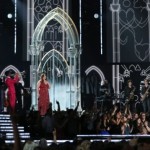Music at Mars Hill is a weekly column by Luke Larsen that seeks to find God amidst the newest trends in both mainstream music and independent music.
The idea of using music as a legitimate tool of protest or political resistance seems to have been abandoned in contemporary Western culture. When we think of music rebellion, we think of Dylan, Baez, and maybe The Clash—these were musicians that governments just did not like having around. However, in our emotionally detached 21st century postmodern culture, music with a political agenda is irrelevant at best and laughably cliche at worst.
On the other side of the world, however, music and official institutions don’t always get along as well as they do here in the States.
The Russian band Pussy Riot is a feminist anti-establishment punk rock seven-piece that would have fit quite well into the 1990s Riot Grrrl movement. They play loud, trashy punk rock and are known for flash-mob style performances. The band’s popularity took off during the protests against President Putin’s re-election earlier this year, eventually culminating in their surprise take over and performance at Cathedral of Christ the Savior Church in Moscow. They took over the altar and performed one minute of their song “Mother of God, Put Putin Away,” before being removed by guards. Three of the women were arrested and recently convicted for “premeditated hooliganism” that was attempting to incite religious hatred against the church.
After they received two years of jail time for their crimes, word has spread around the world; they’ve even been identified as “political prisoners” by Amnesty International. But what was really going on here? Wasn’t this just another case of some rowdy kids who disturbed an otherwise peaceful religious gathering?
There are political, religious, and cultural sides to consider here. First off, based purely on personal rights in a would-be free society, they crudely interrupted a religious service. This is what Putin’s administration called “hooliganism,” which apparently is worthy of two years behind bars.
As Christians, we don’t like the idea of someone coming into our places of worship and crassly bringing their politics into what we think of as distinctly spiritual—especially in a denomination that values reverence as much as the Eastern Orthodox Church does. However, as an American, I feel the pull to cheer for people who stand up against corrupt political oppression. So is this a case of religious persecution or does Pussy Riot have legitimate political motivations behind their over-the-top demonstration?
Below are some lyrics from the song that was performed:
The Church’s praise of rotten dictators /The cross-bearer procession of black limousines/ A teacher-preacher will meet you at school Go to class—bring him money!/Patriarch Gundyaev believes in Putin /B****, better believe in God instead /The belt of the Virgin can’t replace mass-meetings/ Mary, Mother of God, is with us in protest!
Furthermore, here is a quote from a band member’s closing statement at the trial:
“Apparently, it was then that he [Putin] felt the need for more convincing, transcendental guarantees of his long tenure at the helm. It was here that the need arose to make use of the aesthetics of the Orthodox religion, historically associated with the heyday of Imperial Russia, where power came not from earthly manifestations such as democratic elections and civil society, but from God Himself. […] Moreover, it was also agreed that the Russian Orthodox Church, unlike the Soviet era, when the church opposed, above all, the crudeness of the authorities towards history itself, should also confront all baleful manifestations of contemporary mass culture, with its concept of diversity and tolerance.”
It’s the close ties between church and state in Russia that is being fought against here—not the church in general. The band is protesting that the Russian Patriarch has openly supported the Putin Administration, whom one Pussy Riot member calls “a man who is as far as can be from God’s truth.”
The case has me thinking more about life here in the States: What role does music play in U.S. politics today? Are there politics that musicians have become sheepish about? Where are the politically charged musicians standing up against the increasing Middle Eastern wars, National Defense Authorization Act, and Internet freedom bills?
Meanwhile, even in our own social issues here, perhaps the Church has become too quick to embrace political affiliations on both sides of the aisle. Either way, the Putin vs. Pussy Riot case is a reminder to think carefully about the point where music, politics, and religion meet—because it’s definitely not something that’s going to be going away any time soon.











